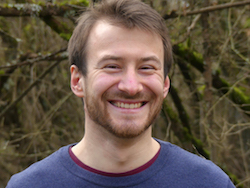Patrick L. Kohl
Dr. Patrick Kohl
Garbenstr. 17

- Biology of social insects, especially honey bees (Apis spp.)
- Pollination ecology
- Behavioral ecology
- Wildlife in the Anthropocene/conservation biology
- Sustainable apiculture
Ecology of wild-living honey bee colonies in German forests (Doctoral research project, sponsored by DBU)
The honeybee is usually considered as a domesticated insect managed by beekeepers for honey production and crop pollination, but Apis mellifera has generally always been a wild species, too. After our finding that wild-living honeybee colonies still occur in German forests (Kohl and Rutschmann 2018) the critical question was whether these colonies form a self-sustaining population (as opposed to the cohort of wild-living colonies being maintained by the recurrent immigration of swarms from apiaries). To clarify this, we monitored the population demography of wild-living colonies in several forest areas over multiple years (Kohl et al. 2022). Furthermore, we investigated how wild-living colonies relate to managed colonies in terms of parasite burden (Kohl et al. 2023), and explored whether parasite burden, nest depredation and/or landscape composition (which, we know, determines floral resource availability) are associated with wild-living colony winter mortality (Kohl & Rutschmann et al. 2023).
- 2023 Graduation Dr. rer. nat. at the Faculty of Biolgy, University of Würzburg; thesis title: "The buzz beyond the beehive: population demography, parasite burden and limiting factors of wild-living honeybee colonies in Germany" (https://doi.org/10.25972/OPUS-33032)
- 2019–2023 Doctoral student at the department of Animal Ecology and Tropical Biology, University of Würzburg, fellow of Deutsche Bundesstifung Umwelt
- 2018–2019 Pre-doctoral researcher at the department of Animal Ecology and Tropical Biology, University of Würzburg, in the group of Prof. Dr. Ingolf Steffan-Dewenter
- 2015–2018 Master studies in Biology at the University of Würzburg: MSc thesis: "Pollination ecology of Clinopodium alpinum along an altitudinal gradient in the Northern Alps"
- 2015–2018 Three research trips as a visiting student to the honey bee lab of the National Centre for Biological Sciences in Bangalore, India; comparative studies on behavior and ecology of three Asian honey bee species (PROMOS grant by the DAAD in 2015, grants by the Bavarian-Indian Centre in 2017 and 2018)
- 09/2013–02/2014 Studies in Zoology, Biogeography and Limnology at the University of Granada, Spain (ERASMUS grant)
- 2011–2014 Bachelor studies in Biology at the University of Münster; BSc thesis project in cooperation with Landwirtschaftskammer NRW (Aufgabengebiet Bienenkunde): "Drone production in naturally nesting and beekeeper-managed honey bee colonies (Apis mellifera)"
scientific publications
2023
Kohl PL, D’Alvise P, Rutschmann B, Roth S, Remter F, Steffan-Dewenter I, Hasselmann M (2023).
Reduced parasite burden in feral honeybee colonies. Ecological Solutions and Evidence 4:e12264. https://doi.org/10.1002/2688-8319.12264
Kohl PL, Rutschmann B, Brockmann A (2023). Dance communication of giant honeybees. In: Abrol DP (ed). Role of giant honeybees in natural and agricultural systems. CRC Press.
Kohl PL*, Rutschmann B*, Sikora LG, Wimmer N, Zahner V, D'Alvise P, Hasselmann M, Steffan-Dewenter I (2023). Parasites, depredators, and limited resources as potential drivers of winter mortality of feral honeybee colonies in German forests. Oecologia 202:465–480. https://doi.org/10.1007/s00442-023-05399-6 *equal contribution
Rutschmann B, Kohl PL, Steffan-Dewenter I (2023). Foraging distances, habitat preferences and seasonal colony performance of honeybees in Central European forest landscapes. Journal of Applied Ecology 60:1056-1066. https://doi.org/10.1111/1365-2664.14389
2022
Kohl PL, Rutschmann B, Steffan-Dewenter I (2022). Population demography of feral honeybee colonies in central European forests. Royal Society Open Science 9: 220565. http://doi.org/10.1098/rsos.220565
Kohl PL & Steffan-Dewenter I (2022). Nectar robbing rather than pollinator availability constrains reproduction of a bee-flowered plant at high elevations. Ecosphere 13(6): e4077. https://doi.org/10.1002/ecs2.4077
Rutschmann B*, Kohl PL*, Machado A, Steffan-Dewenter I (2022). Semi-natural habitats promote winter survival of wild-living honeybees in an agricultural landscape. Biological Conservation 266:109450 ttps://doi.org/10.1016/j.biocon.2022.109450 *equal contribution
2021
George EA, Thulasi N, Kohl PL, Suresh S, Rutschmann B, Brockmann A (2021). Distance estimation by Asian honey bees in two visually different landscapes. Journal of Experimental Biology jeb.242404. https://doi.org/10.1242/jeb.242404
Kohl PL & Rutschmann B (2021). Honey bees communicate distance via non-linear waggle duration functions. PeerJ 9:e11187 DOI 10.7717/peerj.11187 https://doi.org/10.7717/peerj.11187
Young AM*, Kohl PL*, Rutschmann B*, Steffan-Dewenter I, Brockmann A, Dyer FC (2021). Temporal and spatial foraging patterns of three Asian honey bee species in Bangalore, India. Apidologie. https://doi.org/10.1007/s13592-020-00839-1 *equal contribution
2020
Kohl PL, Thulasi N, Rutschmann B, George EA, Steffan-Dewenter I, & Brockmann A (2020). Adaptive evolution of honeybee dance dialects. Proceedings of the Royal Society B, 287(1922), 20200190. https://doi.org/10.1098/rspb.2020.0190
2019
Cammarosano M, Weirauch K, Maruhn F, Jendritzki G, Kohl PL* (2019). They Wrote on Wax. Wax Boards in the Ancient Near East. Mesopotamia LIV (2019), 121-180. *contribution to a chapter on honey bees and traditional apiculture
Requier F, Garnery L, Kohl PL, Njovu HK, Pirk CW, Crewe RM & Steffan-Dewenter I (2019). The conservation of native honey bees is crucial. Trends in ecology & evolution, 34(9), 789-798. https://doi.org/10.1016/j.tree.2019.04.008
2018
Kohl PL* & Rutschmann B* (2018). The neglected bee trees: European beech forests as a home for feral honey bee colonies. PeerJ, 6, e4602. https://doi.org/10.7717/peerj.4602 *equal contribution
popular science articles
2018
Rutschmann B, Kohl PL, Roth S (2018). Beelining – wie man wildlebende Honigbienen findet. Deutsches Bienenjournal 7/2018 pp.13–15
Kohl PL, Rutschmann B (2018). Versteckt und unerforscht – wildlebende Honigbienen in unseren Wäldern. Deutsches Bienenjournal 6/2018 pp.16–17








